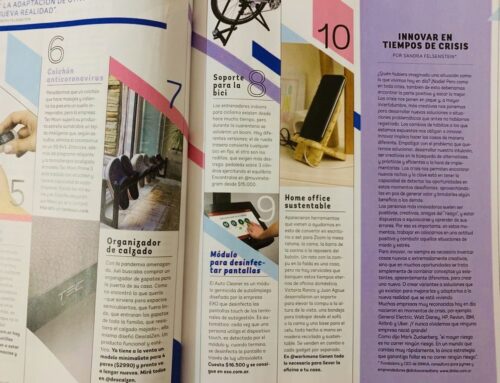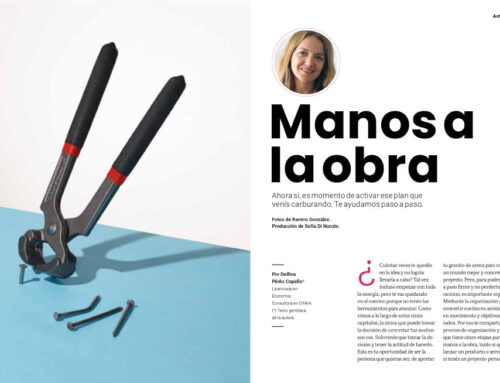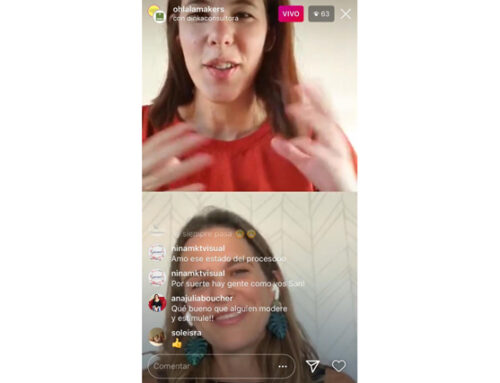“Nunca andes por el camino trazado, pues te conducirá únicamente hacia donde otros fueron”.
Cada vez que abordamos un proyecto de innovación con alguno de nuestros clientes, recurrimos al concepto de esta famosa frase de Graham Bell. La innovación es el motor de cambio, la constante búsqueda de generación de valor; es creatividad aplicada. Estos conceptos me vinieron a la mente cuando hice la interpretación de las palabras de Gabriela Mazza, Directora de Organ&Co, en nuestra primera reunión. Transmitía sus ganas de innovar, de crear, de crecer más aún en la propuesta de valor de su empresa para permanecer en el “top of mind” de sus clientes; esto fue lo que la impulsó a contactar a DINKA.
Nuestro primer encuentro con la reconocida empresa de amenities ecológicos para Hotelería y Spa, fue en sus oficinas anteriores a la inauguración de su nuevo espacio. Los agradables aromas invadían el ambiente, otorgando a nuestra reunión una atmósfera particularmente agradable. En esa primera charla, Gabriela destacó que, si bien la empresa estaba logrando buenos resultados, una importante demanda de sus productos, muy alto nivel de satisfacción de los clientes y buena reputación en el mercado, no existía una proyección clara con objetivos establecidos para el futuro.
DIAGNOSIS and PLAN
Comenzamos a trabajar casi de inmediato, como hacemos siempre desde DINKA, realizando un diagnóstico exhaustivo. Este análisis completo lo realizamos intentando un entendimiento profundo de la organización a través de ir conociendo sus productos, clientes y competencia, propuesta de valor, entrevistando a los integrantes de la empresa, analizando los resultados de los últimos períodos (volumen, tendencias, costos, márgenes, etc.), para luego sacar las primeras conclusiones que nos conducirían a un diagnóstico y consecuentemente, a un plan de trabajo.
Del análisis de lo recabado, concluimos que había que tomar importantes decisiones, fundamentalmente definir una estrategia de crecimiento clara. Para ello resultaba indispensable definir un plan de acción basado en la innovación, que permitiera sostener un crecimiento ordenado de la empresa y prever posibles cambios en el contexto económico- político y de mercado, tales como la liberación de las trabas de importaciones, el fortalecimiento de competidores, la aparición de nuevos competidores, etc.
De aquí se desprendió la necesidad de trabajar en dos líneas. Por un lado, mejorar la eficiencia de la organización (mejoras en su gestión y procesos de trabajo) y por el otro, encarar un proceso de innovación.
THE MANAGEMENT
Como habitualmente hacemos en DINKA, encaramos el proyecto en forma integral. En primer lugar trabajamos en parametrizar los datos de gestión, implementando tableros de control que permitieran analizar la información para la toma de decisiones.
Necesitábamos contar con un buen punto de partida, una buena planificación y un horizonte claro. Todo proceso de cambio lleva tiempo, y es necesario transitar las etapas para lograr una transformación real. Así fue cómo inicialmente nos enfocamos en los tableros de control, para generar los indicadores que mostrarían la rentabilidad del negocio y dónde se apalancaba el mismo.
DETECTION OF OPPORTUNITIES
Previamente a iniciar el proceso de innovación, nos enfocamos en la detección de las oportunidades existentes en el mercado objetivo, hacia las cuales dirigir las acciones.
Desde sus inicios, Organ&Co desarrolló y comercializó sus productos en el marco de la cosmética ecológica y sustentable. En los últimos años, la tendencia mundial hacia la sustentabilidad ha experimentado un enorme crecimiento a todo nivel, impactando también en la industria hotelera responsable y generando una mayor demanda de amenities “eco-friendly”. Argentina representa un destino “verde” para los turistas extranjeros, quienes valoran las acciones en pos de la sustentabilidad. Actualmente no existe ningún competidor que trabaje el concepto de Amenities como un “socio” al momento de mejorar el nivel de satisfacción del huésped.
Asimismo, los clientes satisfechos con los productos utilizados durante su estadía, demandan permanentemente la posibilidad de adquirirlos y seguir utilizándolos en sus casas, generando un canal de ventas adicional.
Por otra parte, el creciente nicho de pequeños hoteles está demandando proveedores que puedan abastecerlos de productos de calidad, sin la exigencia de compra de grandes cantidades.
El análisis de estas oportunidades detectadas, permitió elaborar una estrategia general y acciones particulares, direccionadas a satisfacer las demandas del mercado.
Los objetivos claramente definidos fueron, entre otros, seguir proveyendo a la hotelería eco-sustentable de amenities ecológicos de alta calidad, incrementando el compromiso del cuidado del medio ambiente, brindando asesoramiento a los hoteles en materia de prácticas sustentables y atendiendo lo mejor posible a las necesidades de los pequeños hoteles.
START UP
Una vez establecido el rumbo que se quería seguir y bajo la nueva consigna de “ser el principal proveedor de productos sustentables dentro del mercado hotelero nacional, siendo reconocidos por nuestro compromiso con el medio ambiente”, comenzamos la revisión de cada aspecto que comprendería el cambio. Ya que un proceso de este tipo nunca se puede realizar sobre un solo elemento, sino que es necesario analizar integralmente la situación y ver cómo cada factor juega con los demás, fue necesario actuar sobre diferentes ejes tales como producto, servicio, proceso y comunicación.
Se rediseñó una gran gama de productos, teniendo en cuenta el compromiso con el Medio Ambiente que se quiere transmitir. Esto significa que se reformuló el contenido de los mismos, para que se acerquen el máximo posible de biodegradabilidad. En cuanto a los envases, se migró también hacia alternativas más acorde con el cuidado y la conservación de los recursos naturales. Las etiquetas utilizadas, que hasta el momento eran de papel blanco, fueron migrando hacia el papel reciclado. Se implementó el método de “recarga” mediante el desarrollo del dispenser para el uso del producto a granel, tendiente a una importante reducción de consumo de materiales.
También se reforzó el servicio a los hoteles en concepto de asesoramiento, complementado con la entrega de material instructivo para el Cuidado del Medio Ambiente, con el fin de dejar en claro frente al huésped el compromiso del Hotel con el impacto ambiental.
Por otra parte, en línea con la comunicación, se procedió al lanzamiento del nuevo posicionamiento en el mercado. Esto implicó la revisión y rediseño de la página web, desarrollo de un mailing informativo, contacto con organizaciones asociadas al Medio Ambiente, Turismo y Cosmética.
Por último, como es habitual en muchos de los proyectos que encaramos desde DINKA, luego de definir claramente la nueva estrategia, se realizó una revisión de los procesos, con el objetivo de optimizar la eficiencia de la organización y bajar costos no productivos.
SOCIAL RESPONSABILITY
Para cumplir con el concepto de Triple Bottom Line –término referido a los negocios sustentables-, se implementaron acciones tendientes a la responsabilidad ambiental. Para ello se desarrolló el programa de recolección de jabones, SOS Jabón. El proceso comienza con la recolección de los panes que son desechados en las habitaciones y espacios del hotel, a través de un instructivo entregado por la empresa a las housekeeping. La empresa se encarga de seleccionar y reprocesar los jabones y se los da a diferentes fundaciones para que con sus voluntarios procedan al reciclaje y la fabricación de nuevas pastillas. Éstos son donados a la comunidad o guardados para la asistencia en casos de catástrofes. Este proyecto se sustenta en el hecho de que en un mes, un hotel de 30 habitaciones descarta aproximadamente 20 kg de jabón sin uso. Esto equivale a 6 años de higiene de una familia tipo. Ser testigos de esta desigualdad, nos inspiró a diseñar el programa SOS Jabón, que busca reciclar este descarte para acercarlo a las comunidades más necesitadas.
THE CHALLENGE
En la actualidad la empresa debe trabajar en una nueva estrategia comercial, considerando su trayectoria hasta el momento y adecuando su gestión hacia el futuro con la incorporación de los nuevos elementos a disposición, resultado del trabajo de los últimos meses. En línea con el proceso de innovación realizado, será necesario desarrollar una plataforma de e-commerce que permita complementar su actividad principal. En este sentido, la nueva estrategia comercial deberá ser gestada y ajustada en forma lo más alineada posible con los nuevos objetivos estratégicos trazados. Nuevamente resulta sumamente importante la definición de objetivos comerciales, la implementación de tableros de control comercial, y la utilización de todas las herramientas necesarias que permitan detectar desvíos y actuar rápidamente en consecuencia.
Posteriormente, y en base a un buen análisis de la información disponible, se podrán implementar nuevas acciones comerciales que permitan apalancar más aún las iniciativas elaboradas, la comunicación a los clientes y a la sociedad y así retroalimentar el negocio.
SANDRA FELSENSTEIN
Fundadora y directora de la consultora DINKA.
Ingeniera Industrial (UBA) con posgrado en Marketing Estratégico. Asesoró a más de 40 empresas en cómo “potenciar” los negocios existentes, hasta el armado de nuevos negocios.








